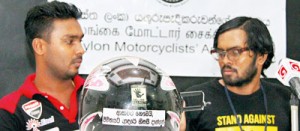News
Motorcyclists head for protest over new helmet rules

The Ceylon Motorcyclists’ Association held a news conference on Wednesday. Pic by Indika Handuwala
The controversy over the full-faced helmets is once again raising its confused head with the Transport Ministry gazetting new regulations on safety standards.The Ceylon Motorcyclists’ Association (CMA) is organising a protest at Galle Face today to express its opposition to the regulations gazetted by Transport Minister Nimal Siripala de Silva.
CMA Secretary Chirantha Amarasinghe said the regulations were a move to reintroduce the ban on full-faced helmets and the association would hold more protests countrywide if the regulations were not withdrawn.
However, Police Traffic Chief Palitha Fernando disputed his claim, saying the regulations were not about full-faced helmets.
“This Gazette notification focuses mainly on open-faced helmets and their safety standards. Motorcyclists can use full-faced helmets though we believe that such helmets hinder the vision of a rider and are unsafe,” the DIG said adding that separate regulations were being drafted to restrict the use of full-faced helmets.
He said Police officers had been instructed to warn motorcyclists who wore helmets that did not conform to the new regulations.
Traders and manufacturers said they were aware of the new regulations and had stopped selling helmets that did not conform to the standards published in the Gazette.
A leading manufacturer said the new regulations required all helmets should have Sri Lanka Standards (SLS) certification.
He said he had obtained SLS certification for his helmets a long time ago, but after that he did not see it was necessary to obtain one as it was not mandatory and the buyers were also not concerned. He said he would now have to go get the certification.
A helmet dealer in Maradana said ban or no ban, helmet sales had crashed.
“Many motorcyclists believe that full-faced helmets have been banned. Therefore they don’t buy.” he said.
Safety or quality was the least of customers’ concerns when buying helmets, he said. “I had not seen a customer who insisted on SLS certification.”
He said motorcyclists should be made aware of the importance of quality and safety features of the helmets they buy or wear.
Helmet importers said that after the new regulations were announced, they had started sending samples to the Sri Lanka Standards Institution (SLSI) to obtain its certification for their products.
One helmet dealer said one of the reasons for motorcyclists’ agitation was that the new regulations prohibited tinted visors. Those who bought such helmets were returning them and buying helmets without tinted visors. He claimed that after the new regulations came into effect, police had taken into custody the riding licences of motorcyclists wearing helmets with tinted visors. They had been told to come with helmets without tinted visors to get their licences.
Traders said they were facing a big financial loss because no one wanted their full-faced helmets and helmets with tinted visors which they had imported before the new regulations were announced.
“I have imported a container full of such helmets. But no one is buying them now,” a desperate trader said.
Some motorcyclists welcomed the new safety standards but said there were not many helmets that conform to the new regulations in the market.
A senior SLSI official said the institution had been testing the standards of helmets for the past 20 years, though it was only rarely a trader wanted SLS certification. But after the Government made SLS certification mandatory, more traders were sending their samples. He said to cope with the rush, they were getting down modern machines.
He also said helmets that could not be tested at the SLSI were sent to countries such as Singapore it cost them nearly Rs 200,000.

